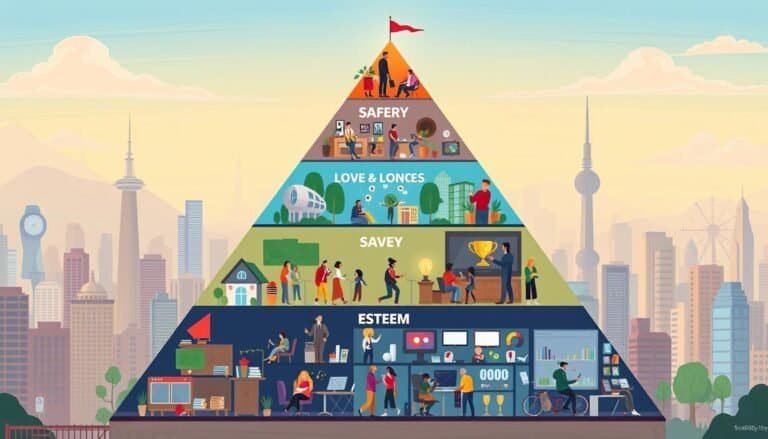Why Do People Misunderstand You? Personality Clues That Explain It
If others often misunderstand you, it could be due to personality cues influencing how they perceive your communication style. Your body language, tone, and gestures play significant roles in how you are interpreted. Developing emotional intelligence can help you recognize and adjust these cues. By honing your nonverbal awareness and practicing active listening, you can enhance understanding and reduce misinterpretations. Consider your assertiveness level, cognitive empathy, and how your personality type affects interactions. Increasing self-awareness can lead to personal growth and better social interactions. Understanding these clues can improve relationships and lessen misunderstandings.
Key Takeaways
- Misinterpreted behaviors due to different communication styles.
- Cognitive biases affecting perception and understanding.
- Personality traits influencing how others perceive you.
- Limited perspective leading to misunderstandings.
- Lack of empathy causing misinterpretations in interactions.
Communication Style
Understanding your communication style can provide valuable insights into how misunderstandings may arise in your interactions with others. Body language and tone of voice play pivotal roles in conveying messages beyond just words.
Your body language, such as gestures, facial expressions, and posture, can sometimes speak louder than your verbal communication. For example, crossing your arms may unintentionally signal defensiveness or disagreement, leading to misunderstandings with others.
Similarly, your tone of voice, including volume, pitch, and inflection, can greatly influence how your message is perceived. A harsh tone may convey anger even if your words are neutral. By being mindful of your body language and tone of voice, you can align them with your intended message, reducing the chances of misunderstandings.
Emotional Intelligence Level
Understanding your emotional intelligence level is essential in managing relationships effectively.
It involves self-awareness in recognizing your own emotions, understanding the feelings of others, and managing emotional reactions appropriately.
Self-Awareness in Emotions
To gain a deeper understanding of yourself and others, it's essential to recognize and acknowledge your own emotions with honesty and clarity. Emotional intelligence hinges on self-reflection, allowing you to navigate interpersonal interactions more effectively. By tuning into your feelings and understanding their triggers, you can cultivate a greater sense of self-awareness.
When you're in touch with your emotions, you become better equipped to express yourself authentically and comprehend how your feelings influence your thoughts and actions. This heightened emotional awareness not only enhances your relationships but also fosters personal growth. Take the time to explore your emotional landscape, embracing both the highs and lows, as it paves the way for a more profound connection with yourself and those around you.
Understanding Others' Feelings
By acknowledging and understanding your own emotions, you lay the groundwork for empathetically grasping the feelings of those around you. To enhance your understanding of others' emotions, consider practicing empathy and validating their feelings.
Engage in perspective-taking to see situations from their point of view, promoting deeper emotional connections. Additionally, try emotional mirroring, reflecting back their emotions to show understanding and support.
Remember, emotional intelligence isn't just about recognizing your own feelings; it's also about being attuned to the emotions of others. By honing these skills, you can build stronger relationships and create a more empathetic environment for everyone involved.
- Practice empathy and validate others' emotions.
- Engage in perspective-taking to understand their point of view.
- Try emotional mirroring to show understanding and support.
- Build stronger relationships through emotional intelligence.
Managing Emotional Reactions
Developing emotional intelligence involves recognizing and managing your emotional reactions in order to navigate interpersonal interactions effectively. Emotional regulation plays a vital role in how you express yourself and understand others. By being aware of your emotions and learning to regulate them, you can respond more thoughtfully in conversations and avoid unnecessary conflicts.
Perception management is also essential; understanding how your emotions influence your perception of a situation can help you approach it with a more balanced viewpoint. Take the time to reflect on your emotional triggers and consider how they impact your interactions with others.
Nonverbal Cues Awareness
Enhancing your awareness of nonverbal cues can greatly improve your understanding of others' emotions and intentions. Paying attention to body language and facial expressions can provide valuable insights into what someone is truly feeling. Here are four key aspects worth noting:
- Eye Contact: The amount of eye contact someone makes can indicate their level of interest or engagement in a conversation. Lack of eye contact might suggest discomfort or disinterest.
- Gestures: Hand movements and gestures can convey a lot about a person's emotions. For example, crossed arms might signal defensiveness, while open gestures can indicate openness and receptiveness.
- Posture: The way someone carries themselves can reveal their confidence level or how comfortable they're in a situation. Leaning in can show interest, while slouching might suggest boredom or fatigue.
- Microexpressions: These fleeting facial expressions can betray someone's true feelings, even if they're trying to conceal them. Learning to recognize microexpressions can help you better understand people's emotions in real-time.
Conflict Resolution Approach
When it comes to resolving conflicts, your communication style can greatly impact the outcome.
By recognizing the emotions involved in a conflict, you can better understand the root causes and work towards a solution.
Implementing effective strategies for resolving conflicts can help bridge the gap and foster better relationships.
Communication Styles Impact
Understanding how different communication styles impact conflict resolution approaches is essential for managing misunderstandings effectively. When dealing with conflicts, consider these key points:
- Active Listening: Engage fully with the speaker, showing interest and understanding.
- Direct Communication: Be clear and concise in expressing your thoughts and feelings.
- Emotional Awareness: Recognize and address emotions that arise during the conflict.
- Adaptability: Flexibility in communication styles can help navigate diverse conflict situations.
Recognizing Emotions in Conflicts
Recognizing emotions in conflicts requires a keen awareness of the underlying feelings and expressions that influence interactions and resolutions. When conflicts arise, it's crucial to identify triggers that fuel emotional responses. By understanding what sets off strong reactions, you can address the root cause more effectively.
Emotional expression management is also crucial in conflict resolution. Learning to express your emotions in a clear and constructive manner can help prevent misunderstandings and defuse tense situations. By acknowledging and validating your emotions, as well as those of others involved, you pave the way for more productive discussions and resolutions.
Developing these skills can lead to more harmonious relationships and smoother conflict resolution processes.
Strategies for Resolving
To effectively resolve conflicts, have you considered implementing a structured approach that focuses on communication and collaboration?
When conflicts arise, it's important to approach them with a mindset geared towards understanding and cooperation. Here are some strategies that can help you navigate through conflicts successfully:
- Active Listening: Truly listen to the other person's perspective without interrupting, showing them that you value their thoughts and feelings.
- Empathy Building: Put yourself in the other person's shoes to understand where they're coming from and why they feel the way they do.
- Conflict Resolution Techniques: Learn and apply various conflict resolution methods to address disagreements constructively.
- Perspective Taking: Try to see the situation from different angles to gain a broader understanding and find common ground.
Listening Skills
In conversations, actively engaging with the speaker is essential for gaining a deeper understanding of their perspective and building stronger connections. Active listening involves not only hearing the words spoken but also understanding the emotions and intentions behind them. By providing empathetic responses, you show the speaker that you are truly present and interested in what they have to say. This can help prevent misunderstandings and foster better communication.
| Active Listening Skills | Description | Benefits |
|---|---|---|
| Maintain eye contact | Show attentiveness | Enhances connection |
| Ask clarifying questions | Seek deeper understanding | Avoid misinterpretation |
| Reflect on what was said | Demonstrate understanding | Build trust |
| Avoid interrupting | Respect the speaker's thoughts | Encourage open dialogue |
| Paraphrase key points | Confirm comprehension | Clarify information |
Empathy Capacity
You might find that your lack of understanding in certain situations stems from an emotional disconnect with others' feelings.
By not fully grasping the emotions at play, your perspective may become limited, hindering your ability to empathize effectively.
Recognizing and working on enhancing your empathy capacity can help bridge these gaps and foster better connections with those around you.
Lack of Understanding
Lack of understanding in communication often arises due to a deficiency in empathy capacity, hindering the ability to connect with others on a deeper emotional level. When empathy is lacking, misinterpretation patterns and communication barriers can easily emerge, leading to confusion and frustration.
Understanding others' perceived intentions and being attuned to social cues becomes essential when empathy is limited. To overcome this, it's vital to actively listen, practice putting yourself in the other person's shoes, and pay attention to non-verbal cues.
By honing your empathy skills, you can bridge the gap in understanding, fostering better relationships and more effective communication.
- Actively listen to others.
- Practice empathy by imagining yourself in their position.
- Pay attention to non-verbal cues.
- Foster better relationships through improved understanding.
Emotional Disconnect
Exploring the complexities of emotional disconnect in communication can greatly impact the depth of understanding between individuals. Sometimes, there's an emotional distance that creates perception issues, leading to misunderstood signals and relational disconnect.
You may find that despite your best efforts to express yourself clearly, there seems to be a disconnect in how your emotions are received and understood by others. This can be frustrating and may lead to feelings of isolation or being constantly misunderstood.
Understanding your own emotional cues and learning to interpret the signals of those around you can help bridge this gap. By being attentive to non-verbal cues and actively listening to others, you can work towards fostering better emotional connections and reducing misunderstandings.
Limited Perspective
In understanding limited perspectives within empathy capacity, one must explore the intricacies of how individuals perceive and relate to the emotions of others. Sometimes, your ability to empathize is hindered by various factors, leading to misunderstandings. Here are four key points worth exploring:
- Perceived Intentions: Your understanding of someone's intentions may be clouded by your own biases or preconceptions.
- Misinterpreted Behaviors: Actions can be misread based on your personal experiences and emotions, affecting how you interpret others' behaviors.
- Cognitive Biases: Your brain's natural tendency to take mental shortcuts can impact how accurately you perceive and empathize with others.
- Communication Styles: Differences in communication approaches can lead to misunderstandings, especially when trying to empathize with others.
Assertiveness Level
Understanding your assertiveness level can provide valuable insights into how you communicate and interact with others. Assertiveness boundaries play an essential role in how your message is perceived by those around you. If you tend to be overly passive, others might misinterpret your intentions as uncertainty or lack of confidence. On the other hand, if your assertiveness leans towards aggression, people may perceive you as domineering or confrontational. Striking a balance where you express your thoughts and feelings clearly while also respecting others' viewpoints is key.
Emotional expression is another aspect closely tied to assertiveness. When your assertiveness level is low, you might struggle to convey your emotions effectively, leading to misunderstandings. Conversely, if your assertiveness is high, you may come across as overly emotional or intense in certain situations. Being aware of how your assertiveness influences your emotional expression can help you adjust your communication style to enhance understanding and avoid misinterpretations. Remember, assertiveness is about finding the right blend of expressing yourself confidently while also being considerate of others' feelings.
Cognitive Empathy
Your ability to understand and relate to the thoughts and perspectives of others, known as cognitive empathy, plays a pivotal role in effective communication and building strong relationships. Developing cognitive empathy can greatly enhance your interactions with others by allowing you to grasp their viewpoints and emotions more accurately.
Here are some insights to help you navigate the domain of cognitive empathy:
- Empathy Development: Practice active listening during conversations, focus on understanding the other person's perspective without judgment.
- Cognitive Understanding: Put yourself in the other person's shoes to comprehend their feelings and reactions better.
- Social Interactions: Pay attention to non-verbal cues such as body language and tone of voice to interpret emotions accurately.
- Emotional Responses: Reflect on how your words and actions may impact others emotionally, showing empathy in your responses.
Personality Type Influence
Personality types greatly influence how individuals perceive, interact, and communicate with others in various social settings. Your unique personality traits play a significant role in shaping how you approach conversations, interpret gestures, and express emotions.
Misinterpretation often arises when your behavioral patterns clash with those of others, leading to misunderstandings that can strain relationships. For example, if you tend to be more introverted and analytical, you may struggle to understand the perspectives of individuals who are extroverted and emotionally expressive. This difference in communication styles can result in misconstrued intentions and feelings.
Conversely, individuals with similar personality traits may find it easier to connect and communicate effectively due to shared tendencies and preferences. Recognizing how your personality type influences your interactions with others can help you navigate social situations with greater awareness and empathy, minimizing the chances of misunderstandings and promoting more harmonious relationships.
Self-Awareness Level
Successfully navigating social interactions demands a keen awareness of how your self-awareness level influences your perceptions and responses to others' behaviors. Understanding yourself better through self-reflection practices is essential for personal growth. Here are four key points to ponder:
- Self-Reflection Practice: Engaging in regular self-reflection allows you to explore your thoughts, emotions, and reactions, providing valuable insights into your behavior patterns.
- Self-Perception Accuracy: Your level of self-awareness directly impacts how accurately you perceive your actions and their effects on social interactions.
- Social Interactions: Being mindful of your self-awareness level can help you navigate various social situations more effectively, fostering better communication and relationships.
- Personal Growth: Increasing your self-awareness leads to personal growth by enabling you to identify areas for improvement and make positive changes in your behavior and interactions with others.
Conclusion
You may find that people misunderstand you because of a combination of factors such as your communication style, emotional intelligence level, and nonverbal cues awareness.
Surprisingly, a study showed that 55% of communication is nonverbal, highlighting the importance of being aware of how you're coming across to others.
By being mindful of these personality clues and working on improving them, you can enhance your relationships and avoid misinterpretations.








